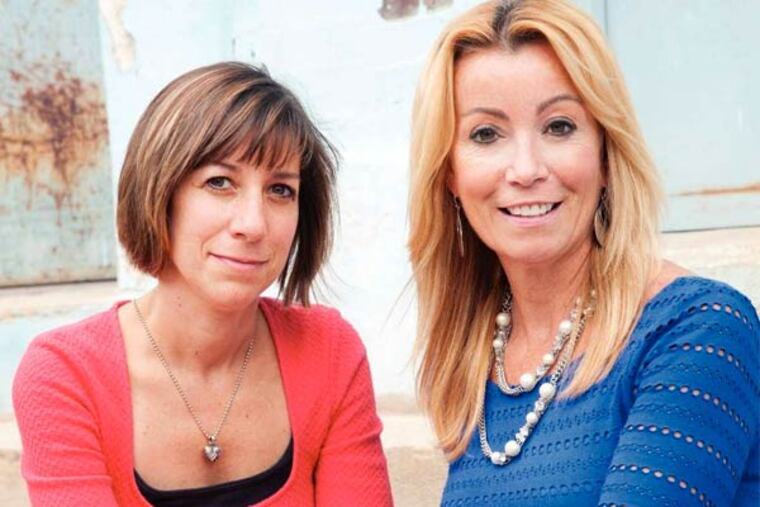A story that could only happen in Philly
While exposing police corruption and earning a Pulitzer Prize, Philadelphia Daily News reporters Wendy Ruderman and Barbara Laker encountered dozens of unforgettable characters.

While exposing police corruption and earning a Pulitzer Prize, Philadelphia Daily News reporters Wendy Ruderman and Barbara Laker encountered dozens of unforgettable characters.
Some of those characters, inside and outside the police department, contribute to the narrative thread of the book-length exposé the journalists have titled Busted. But, read a certain way, the book features its urban setting more than any individual. The main character, actually, is Philadelphia.
Yes, book-length sagas of police corruption have been set in other cities, so in that sense what Ruderman and Laker discovered through dogged and sometimes dangerous reporting is not unique. And yet, it seems the special flavor of police corruption uncovered by the duo would not have happened quite this way anywhere else but Philly.
The uniqueness of the city spawned the unique setting of the building that served as home to two unique and very different newspapers, the Philadelphia Daily News and The Inquirer. The Daily News "was the Inquirer's brassy little sister, with flaming red hair and an attitude." Ruderman and Laker describe the building as "a giant wedding cake topped with a clock tower and brass dome . . . . The edifice stood alone on Broad Street, cut off from the city's other skyscrapers by the expressway. Inga Saffron, the Inquirer's acclaimed architecture critic, liked to say that the building's location was symbolic of an independent press, an unbiased government watchdog, " 'the noble, lone seeker of truth.' "
Inside that building, Ruderman and Laker met Ventura "Benny" Martinez for the first time in December 2008, when he sought them out to blow the whistle on himself and Philadelphia police officer Jeff Cujdik, a key member of the narcotics squad.
Martinez had never dealt with newspaper reporters before, but he feared for his life, believing his alleged partner in crime, Cujdik, might kill not only Martinez but also the rest of the family. Maybe coming clean to journalists would constitute some sort of protection against death, given that Cudjik seemed to have concluded that drug dealer Martinez had outlived his usefulness in ripping off narcotics-dealing criminals. The monetary gains from those ripoffs were allowing Martinez, Cudjik, and perhaps others within law enforcement to live above any licit earnings levels.
The lawbreaking by police did not stop there, either, according to Martinez. A member of the Cudjik team demonstrated a penchant for assaulting women residing at the sites of the raids. Plus, Martinez disclosed, Cudjik and his thugs with badges and guns would rush into retail establishments, often owned by immigrants, knocking out security cameras before stealing cash and assorted merchandise under the pretext that the merchants were supposedly selling drug-related supplies.
After opening the book with the Martinez meeting, Ruderman and Laker offer readers a journalism procedural, a genre that has become somewhat common in the wake of All the President's Men, the best-selling book by Washington Post reporters Carl Bernstein and Bob Woodward published 40 years ago and adapted by Hollywood screenwriters with Dustin Hoffman and Robert Redford cast as the journalists.
First-rate investigative reporting is almost always time-consuming and difficult. Ruderman and Laker explain how they risked their safety by entering neighborhoods and residences without weapons, without badges. Yes, they sometimes felt anxious, and their family members worried. But they charged ahead, fearless to the casual observer, because the story trumped personal safety and common sense. Journalists are sometimes like that.
Throughout the narrative, Ruderman and Laker interject their personal backstories, explaining how they came to be "like that." They are sometimes self-deprecating and regularly candid about their workaholic natures, their offbeat personalities, their romantic lives, and the friendship they honed in the newsroom.
Ruderman and Laker meshed as a team on a professional level, despite their wildly divergent personalities. Newsrooms have forged such partnerships before. Bernstein and Woodward were so incompatible in so many ways that the relatively fleeting success of their professional partnership as the engines of the Watergate scandal feels almost miraculous. At The Inquirer, Don Barlett and Jim Steele pulled together to report amazing exposé after amazing exposé, despite their divergent natures and their complete abstinence from socializing outside the newsroom.
It is too soon to say whether Ruderman and Laker will ever work closely together again to produce any exposé as meaningful and sensational as what they describe in Busted. Whether they do or not, Busted is a welcome addition to the literature of journalism procedurals.
BUSTED
A Tale of Corruption and Betrayal in the City of Brotherly Love
By Wendy Ruderman and Barbara Laker
Harper. 256 pp. $24.99
AUTHOR APPEARANCES
Wendy Ruderman and Barbara Laker: "Busted"
March 18: 7:30 p.m., Free Library of Philadelphia, 1901 Vine St. Admission free. Information: 215-567-4341 or www.freelibrary.org/authorevents
March 19: 7 p.m., Barnes & Noble, Towne Place at Garden State Park, 911 Haddonfield Road, Cherry Hill. Information: 856-486-1492.
March 20: 7 p.m., Chester County Book Company, 967 Paoli Pike, West Chester. Information: 610-696-1661 or www.chestercountybooks.com
EndText